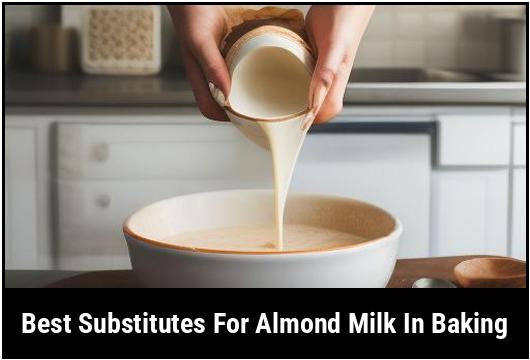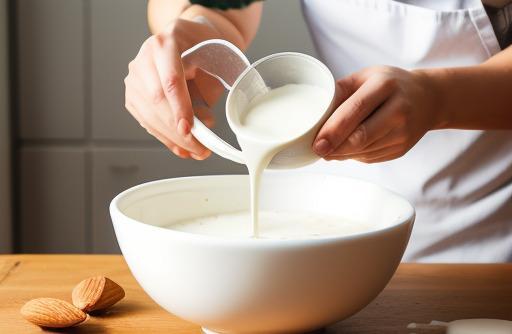Best Substitutes For Almond Milk In Baking

Almond milk has gained popularity in recent years as a dairy-free alternative to cow’s milk. It has become a staple ingredient in baking, providing a creamy texture and nutty flavor to various recipes. However, if you have run out of almond milk or have an allergy, finding a suitable substitute can be crucial. Luckily, there are several alternatives that can effortlessly replace almond milk in baking without sacrificing taste or texture. In this article, we will explore the best substitutes for almond milk in baking, how to choose the right substitute for your recipe, and provide some delicious recipes to try.
Key Takeaways
- Almond milk is a popular dairy-free alternative in baking, but there are several substitute options available.
- The best substitute for almond milk in baking depends on the recipe and specific dietary needs or allergies.
- Soy milk, rice milk, oat milk, coconut milk, and cashew milk are some of the top substitutes for almond milk in baking.
- When choosing a substitute, consider flavor, texture, and potential allergies or dietary restrictions.
- Experimenting with different substitutes can lead to unique and flavorful results in your baked goods.
Why You Need A Substitute For Almond Milk In Baking
There are various reasons why you may need to find a substitute for almond milk in your baking endeavors. Some common situations include:
- Allergies: Almond allergies are relatively common, and individuals with a nut allergy need to avoid almond products, including almond milk.
- Dietary restrictions: If you follow a specific diet, such as the Paleo or Whole30 diet, almond milk may not be allowed. In such cases, finding a suitable substitute becomes important.
- Availability: Sometimes, you may simply run out of almond milk and still want to continue with your baking plans. Having alternative options can save the day.
Regardless of the reason, it’s essential to have a good understanding of the available options to ensure your baked goods turn out just as delicious as intended.
Types Of Substitutes For Almond Milk In Baking

Several substitutes can replace almond milk in baking. The key is to choose a substitute that provides a similar texture and taste, and that complements the other ingredients in your recipe. Here are some popular options:
-
Soy Milk: Soy milk is undoubtedly one of the most widely available and versatile plant-based milk alternatives. It has a creamy texture and a mild, neutral taste, making it an excellent substitute for almond milk in baking. Soy milk is also a good source of protein, which can help give structure to your baked goods.
-
Rice Milk: Rice milk is made from milled rice and water. It has a thinner consistency compared to almond milk, but it can work well in recipes that don’t require a thick, creamy texture. Rice milk has a subtly sweet flavor that can enhance the taste of your baked goods.
-
Oat Milk: Oat milk is another popular dairy-free milk option that can be used as a substitute for almond milk in baking. It has a creamy consistency similar to cow’s milk, making it suitable for a wide range of recipes. Oat milk adds a subtle oaty flavor, which can enhance the taste of baked goods such as cookies and muffins.
-
Coconut Milk: Coconut milk is rich, creamy, and provides a distinct tropical flavor to baked goods. It works best in recipes that pair well with its taste, such as coconut-based desserts or tropical-themed cakes. However, it may alter the texture slightly due to its higher fat content, so it’s important to consider the desired outcome of your recipe.
-
Cashew Milk: Cashew milk is made by blending cashews with water. It has a creamy texture and a slightly sweet, nutty flavor. Cashew milk can be a suitable substitute for almond milk in baking, particularly in recipes that benefit from the nutty taste. It is also a good source of healthy fats, which can contribute to the richness of your baked goods.
These substitutes are readily available in most grocery stores, making them convenient choices when you’re in need of an almond milk alternative.
Best Substitutes For Almond Milk In Baking

-
Soy Milk:
- Soy milk is the closest in terms of texture and taste to almond milk, making it an excellent substitute in baking. It provides a creamy consistency, and its mild flavor won’t overpower the other ingredients in your recipe.
- It is particularly effective in recipes like cakes, muffins, and bread, where its protein content helps with structure and stability.
- When using soy milk as a substitute, opt for the unsweetened variety to avoid adding unnecessary sweetness to your baked goods.
-
Rice Milk:
- Rice milk has a thinner consistency than almond milk, so it may not work well in recipes that require a thick texture. However, it can be a suitable substitute in recipes like pancakes, crepes, and light desserts.
- The subtly sweet taste of rice milk can complement baked goods that don’t require a dominant flavor profile. If your recipe already has strong flavors, using rice milk can help balance them out.
-
Oat Milk:
- Oat milk has a creamy texture and a slightly oaty flavor, which can enhance the taste of baked goods. It is suitable for a wide range of recipes, including cookies, cakes, and muffins.
- Oat milk is known for its ability to add moistness to baked goods. Its high fiber content also helps with binding, resulting in tender and delicious treats.
- When using oat milk as a substitute for almond milk, choose the unsweetened variety to have better control over the overall sweetness of your recipe.
-
Coconut Milk:
- Coconut milk is a unique substitute that adds a tropical twist to your baked goods. It works best in recipes that pair well with its flavor, such as coconut-based desserts, tropical cakes, or curries.
- Keep in mind that coconut milk has a higher fat content compared to almond milk, so it may affect the texture and richness of your baked goods. Adjust the amount of coconut milk accordingly to achieve the desired outcome.
-
Cashew Milk:
- Cashew milk has a creamy texture and a slightly sweet, nutty flavor. It can be a suitable replacement for almond milk in baking, especially in recipes that benefit from a nutty taste.
- Cashew milk is particularly great for recipes like cheesecakes, quick bread, or muffins. Its natural creaminess adds richness to the baked goods, making them moist and flavorful.
- If you’re using cashew milk as a substitute, choose the unsweetened variety to maintain control over the overall sweetness of your recipe.
Choosing The Right Substitute For Almond Milk In Baking

When choosing a substitute for almond milk in baking, consider the following factors:
-
Flavor compatibility: Consider the flavor profile of the substitute you choose and how it will complement the other ingredients in your recipe. For example, if you’re making a coconut cake, coconut milk would be a perfect choice for both flavor and texture.
-
Texture: The texture of the substitute is crucial in ensuring the desired consistency of your baked goods. If a recipe calls for a thick and creamy almond milk, opt for a substitute like soy milk or cashew milk, which mimic almond milk’s texture.
-
Dietary restrictions: If you or someone you’re baking for has specific dietary restrictions or allergies, choose a substitute that is suitable for them. For example, if you’re baking for someone with a soy allergy, soy milk may not be a viable substitute.
-
Availability: Consider the availability of the substitute in your area. While soy milk and rice milk are easily found in most grocery stores, other alternatives like oat milk or cashew milk may require a special trip to a health food store. Choose a substitute that is convenient for you to obtain.
Experimenting and trying different substitutes can lead to unique and flavorful results in your baked goods. Don’t be afraid to get creative and find the perfect substitute for your specific recipe.
Pro tip: When replacing almond milk with a substitute, start by using the same quantity as called for in the recipe. If the batter or dough seems too dry, gradually add more substitute until the desired consistency is achieved. If the substitute has a different sweetness level compared to almond milk, adjust the sugar accordingly.
Cooking With Substitutes For Almond Milk In Baking

Using a substitute for almond milk in baking requires proper consideration to ensure a successful outcome. Here are some tips to help you navigate the process:
-
Measurements: When using a substitute for almond milk in a recipe, start with the same quantity as called for in the recipe. This will give you a baseline to work with. If necessary, adjust the quantity based on the desired texture and consistency of your batter or dough.
-
Texture: Keep in mind that different substitutes have different consistencies. If you’re using a thinner substitute like rice milk, you may need to thicken the batter or dough with additional dry ingredients, such as flour or oats. Conversely, if you’re using a thicker substitute like cashew milk, you may need to add a little extra liquid to achieve the desired texture.
-
Flavor: Consider the flavor of your substitute and how it will affect the overall taste of your baked goods. Some substitutes, like coconut milk, may impart a distinct flavor that may not work well with certain recipes. Be mindful of flavor compatibility to ensure the best results.
-
Allergies: If you or anyone you’re baking for has allergies or dietary restrictions, ensure that the chosen substitute is suitable and safe for consumption. Double-check ingredient labels and avoid cross-contamination with any potential allergens.
By following these guidelines, you can confidently use substitutes for almond milk in your baking ventures and create delicious treats.
Recipes Using Substitutes For Almond Milk In Baking

To get you started on using substitutes for almond milk in baking, here are three delicious recipes to try:
1. Vegan Chocolate Chip Cookies
Ingredients:
- 1 1/2 cups all-purpose flour
- 1/2 teaspoon baking soda
- 1/2 teaspoon salt
- 1/2 cup vegan butter, softened
- 1/2 cup coconut sugar
- 1/4 cup rice milk (substitute for almond milk)
- 1 teaspoon vanilla extract
- 1 cup vegan chocolate chips
Instructions:
- Preheat your oven to 350°F (175°C). Line a baking sheet with parchment paper.
- In a medium bowl, whisk together the flour, baking soda, and salt.
- In a large mixing bowl, cream together the vegan butter and coconut sugar until light and fluffy.
- Add the rice milk and vanilla extract to the butter mixture and mix until well combined.
- Gradually add the dry ingredients to the wet ingredients, mixing just until combined.
- Fold in the vegan chocolate chips.
- Drop rounded tablespoons of the dough onto the prepared baking sheet, spacing them about 2 inches apart.
- Bake for 10-12 minutes, or until the edges are golden brown.
- Remove from the oven and let cool on the baking sheet for 5 minutes, then transfer to a wire rack to cool completely.
2. Vegan Banana Bread
Ingredients:
- 1 3/4 cups all-purpose flour
- 1 teaspoon baking soda
- 1/2 teaspoon salt
- 1/2 cup coconut sugar
- 1/4 cup melted coconut oil
- 1/4 cup oat milk (substitute for almond milk)
- 3 ripe bananas, mashed
- 1 teaspoon vanilla extract
Instructions:
- Preheat your oven to 350°F (175°C). Grease a 9×5-inch loaf pan.
- In a large bowl, whisk together the flour, baking soda, and salt.
- In a separate bowl, mix together the coconut sugar, melted coconut oil, oat milk, mashed bananas, and vanilla extract.
- Gradually add the wet ingredients to the dry ingredients, mixing just until combined.
- Pour the batter into the prepared loaf pan and smooth the top with a spatula.
- Bake for 50-60 minutes, or until a toothpick inserted into the center comes out clean.
- Remove from the oven and let cool in the pan for 10 minutes, then transfer to a wire rack to cool completely before slicing.
3. Vegan Blueberry Muffins
Ingredients:
- 2 cups all-purpose flour
- 1/2 cup granulated sugar
- 1 tablespoon baking powder
- 1/2 teaspoon salt
- 1 cup oat milk (substitute for almond milk)
- 1/4 cup melted coconut oil
- 1 teaspoon vanilla extract
- 1 cup fresh or frozen blueberries
Instructions:
- Preheat your oven to 375°F (190°C). Line a muffin tin with paper liners.
- In a large bowl, whisk together the flour, sugar, baking powder, and salt.
- In a separate bowl, mix together the oat milk, melted coconut oil, and vanilla extract.
- Gradually add the wet ingredients to the dry ingredients, mixing just until combined.
- Gently fold in the blueberries.
- Fill each muffin cup about two-thirds full with the batter.
- Bake for 18-20 minutes, or until a toothpick inserted into the center comes out clean.
- Remove from the oven and let cool in the muffin tin for 5 minutes, then transfer to a wire rack to cool completely.
Feel free to modify these recipes by using your preferred substitute for almond milk. Get creative and enjoy the journey of discovering unique flavor combinations!
Storage And Shelf Life Of Substitutes
The storage and shelf life of substitutes for almond milk vary depending on the specific type of substitute. Here are some general guidelines:
-
Soy Milk: Soy milk can be stored in the refrigerator for up to 7-10 days in its original container, sealed tightly. Check the expiration date on the carton for a more accurate timeframe.
-
Rice Milk: Rice milk has a shorter shelf life compared to other substitutes. It is best consumed within 3-5 days of opening and should be stored in the refrigerator.
-
Oat Milk: Oat milk can be stored in the refrigerator for up to 7-10 days after opening. Shake the bottle well before each use, as separation is normal.
-
Coconut Milk: Coconut milk typically comes in cans. Once opened, transfer any unused coconut milk to a sealed container and refrigerate. It can last for 4-7 days in the refrigerator.
-
Cashew Milk: Cashew milk can be stored in the refrigerator for up to 5-7 days. Give it a good shake before each use, as separation may occur.
Always check the labels and follow any specific instructions provided by the manufacturer for the best storage practices. If the substitute develops an off-putting smell, taste, or appearance, discard it to ensure food safety.
Conclusion
Having a suitable substitute for almond milk in baking is essential for those with allergies, dietary restrictions, or limited availability. Fortunately, several substitutes can replace almond milk without compromising the taste or texture of your baked goods. Options such as soy milk, rice milk, oat milk, coconut milk, and cashew milk offer a range of flavors and consistencies to choose from. When selecting a substitute, consider factors such as flavor compatibility, texture, dietary restrictions, and availability. Experiment with different substitutes to discover unique and delicious results. With these substitutes and our provided recipes, you can confidently create baked treats that cater to your specific needs and preferences, all while enjoying the wonders of dairy-free baking.
FAQS
What Are Other Milk Substitutes That Can Be Used In Place Of Almond Milk For Baking?
Some of the popular milk substitutes include coconut milk, soy milk, oat milk, rice milk, and hemp milk. These substitutes can work well in recipes that call for almond milk and can offer different flavors and textures to baked goods.
How Does Using A Different Milk Substitute Affect The Taste And Texture Of Baked Goods?
An alternative milk substitute can significantly impact the flavor and texture of baked goods. Depending on the type of milk used, there may be subtle differences in texture, sweetness, and overall taste.
Can I Use Water As A Milk Substitute In Baking Recipes?
While water can be used as a substitute for almond milk, it may not provide the desired creaminess and richness in baked goods. Milk alternatives like coconut milk, oat milk, or soy milk are better options for replicating the texture and flavor of almond milk in baking recipes.
How Do I Determine The Right Amount Of Alternative Milk Substitute To Use In A Recipe?
The amount of alternative milk substitute used for baking varies from recipe to recipe. Always consult the recipe to determine the volume of milk required, and adjust it accordingly based on the type of milk alternative used. Some milk substitutes can be thicker than others, so you may need to adjust the amount accordingly.
Are There Any Similarities Or Differences In Using Milk Substitutes In Baking Versus Cow’s Milk?
There are some differences in using alternative milk substitutes versus cow’s milk, including differences in texture, fat content, and sweetness. However, alternative milk substitutes can be used successfully in any baking recipe that calls for cow’s milk, often with little or no adjustment needed.
Sources
About the Author Jenny
I'm Jenny, a housewife with an unwavering passion for food. My culinary journey began with my grandmother's kitchen, and it's now a full-fledged food blog. I've turned my love for cooking into a creative outlet, sharing recipes and stories with a global community of fellow food enthusiasts. It's proof that being a housewife can also mean pursuing your passions and savoring life's delectable moments.
